外研社必修四 module 4 great scientists cultural corner and language points课件(共18ppt)
文档属性
| 名称 | 外研社必修四 module 4 great scientists cultural corner and language points课件(共18ppt) |

|
|
| 格式 | zip | ||
| 文件大小 | 1.4MB | ||
| 资源类型 | 教案 | ||
| 版本资源 | 外研版 | ||
| 科目 | 英语 | ||
| 更新时间 | 2020-06-16 00:00:00 | ||
图片预览

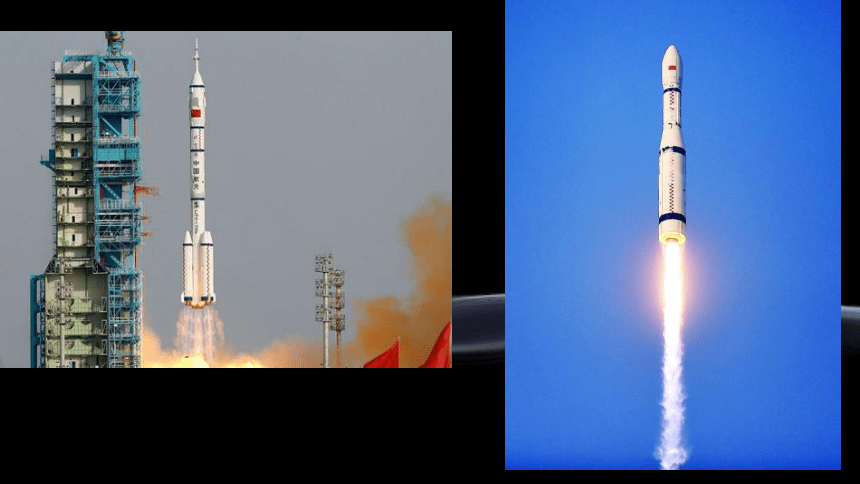
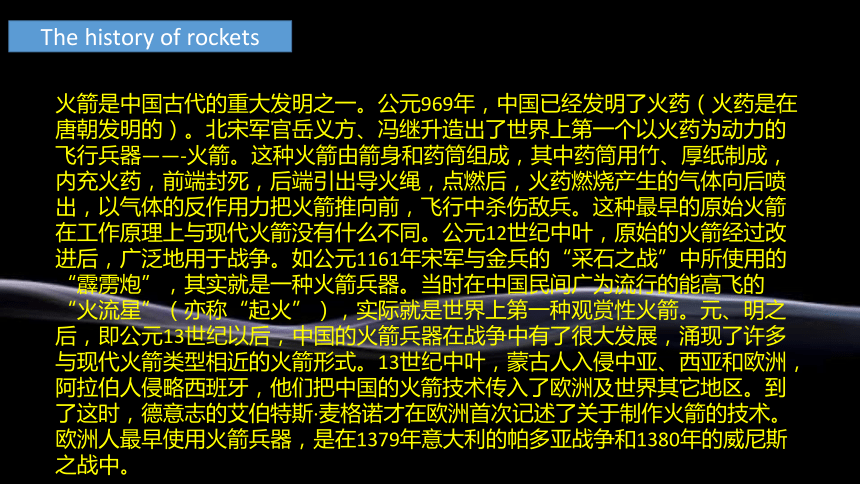
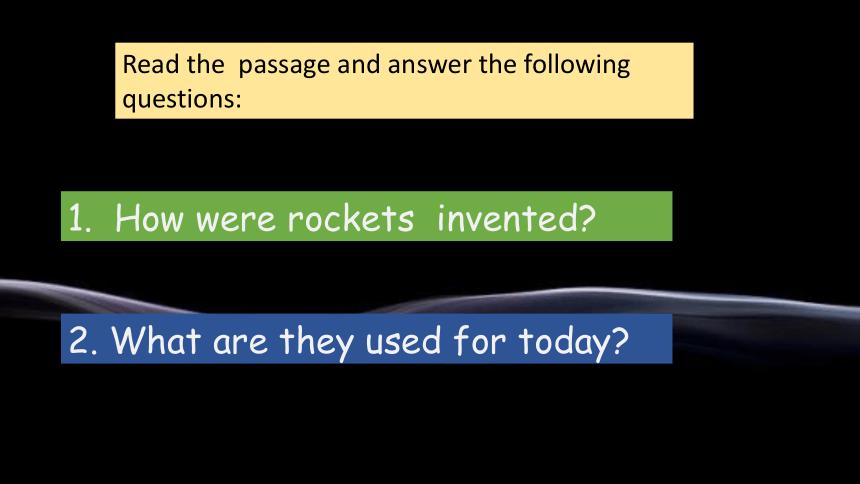
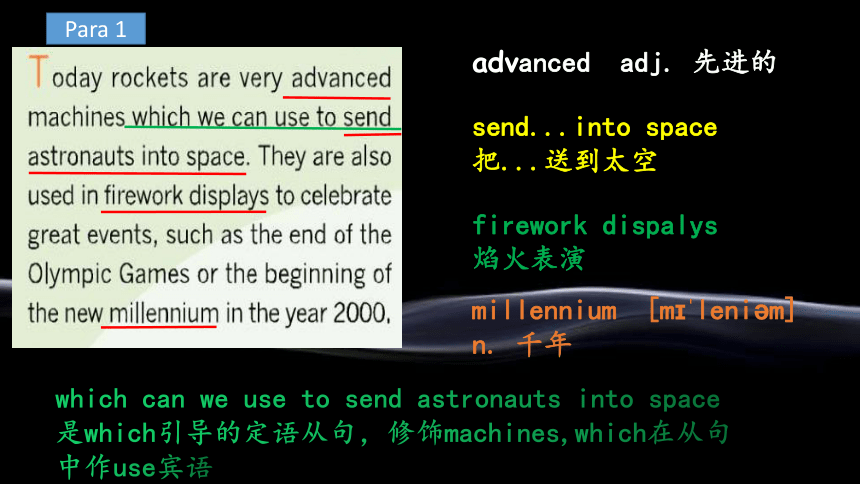
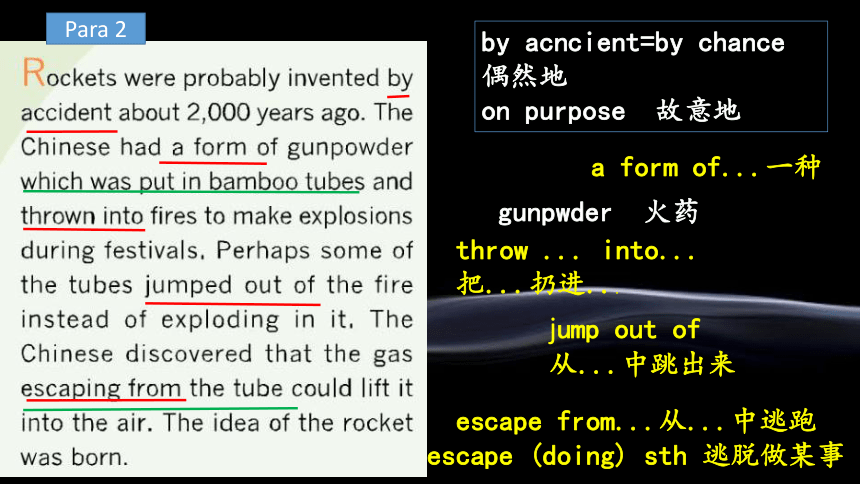
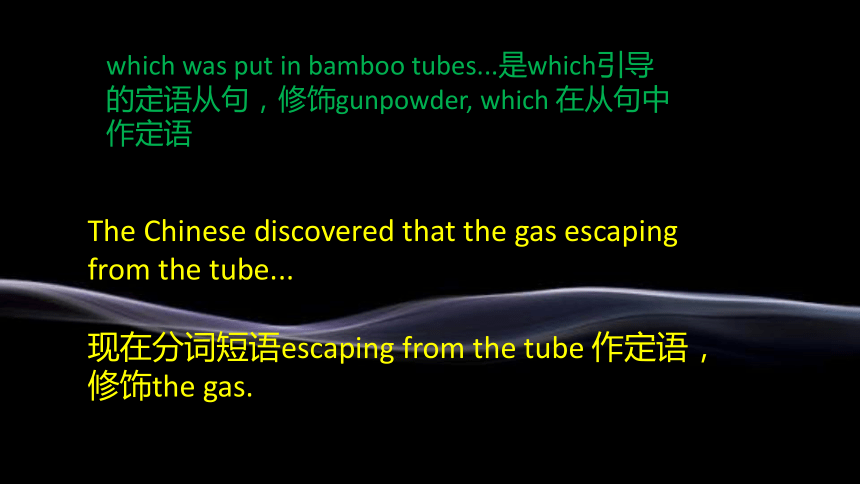
文档简介
(共18张PPT)
Module
4
Cultural
Corner
Rockets
火箭是中国古代的重大发明之一。公元969年,中国已经发明了火药(火药是在唐朝发明的)。北宋军官岳义方、冯继升造出了世界上第一个以火药为动力的飞行兵器——-火箭。这种火箭由箭身和药筒组成,其中药筒用竹、厚纸制成,内充火药,前端封死,后端引出导火绳,点燃后,火药燃烧产生的气体向后喷出,以气体的反作用力把火箭推向前,飞行中杀伤敌兵。这种最早的原始火箭在工作原理上与现代火箭没有什么不同。公元12世纪中叶,原始的火箭经过改进后,广泛地用于战争。如公元1161年宋军与金兵的“采石之战”中所使用的“霹雳炮”,其实就是一种火箭兵器。当时在中国民间广为流行的能高飞的“火流星”(亦称“起火”),实际就是世界上第一种观赏性火箭。元、明之后,即公元13世纪以后,中国的火箭兵器在战争中有了很大发展,涌现了许多与现代火箭类型相近的火箭形式。13世纪中叶,蒙古人入侵中亚、西亚和欧洲,阿拉伯人侵略西班牙,他们把中国的火箭技术传入了欧洲及世界其它地区。到了这时,德意志的艾伯特斯·麦格诺才在欧洲首次记述了关于制作火箭的技术。欧洲人最早使用火箭兵器,是在1379年意大利的帕多亚战争和1380年的威尼斯之战中。
The
history
of
rockets
Read
the
passage
and
answer
the
following
questions:
1.
How
were
rockets
invented?
2.
What
are
they
used
for
today?
advanced
adj.
先进的
send...into
space
把...送到太空
firework
dispalys
焰火表演
millennium
[m??leni?m]
n.
千年
which
can
we
use
to
send
astronauts
into
space是which引导的定语从句,修饰machines,which在从句中作use宾语
Para
1
by
acncient=by
chance
偶然地
on
purpose
故意地
a
form
of...一种
throw
...
into...把...扔进...
gunpwder
火药
jump
out
of
从...中跳出来
escape
from...从...中逃跑
escape
(doing)
sth
逃脱做某事
Para
2
The
Chinese
discovered
that
the
gas
escaping
from
the
tube...
现在分词短语escaping
from
the
tube
作定语,
修饰the
gas.
which
was
put
in
bamboo
tubes...是which引导的定语从句,修饰gunpowder,
which
在从句中作定语
Para
3
1.
at
war
with...
与...交战
at
peace
with...
与...和平共处
2.
shoot
arrows
射箭
3.
be
attached
to...
被栓(捆)到...上
4.
in
a
straight
direction
沿直线方向
in
all
directions=in
every
direction
朝四面八方
in
the
direction
of
朝...方向
under
one's
direction=under
the
direction
of
sb
在某人
指导下
5.
over
the
surface
of...在...表面之上
6.
which
helped
keep
the
rocket
moving...是which
引导的定语从句,修饰a
long
stick,
which
在从句中作主语。
7.
it
is
possible
that
...是可能的。
it
是形式主语,真正的主语是that
后面的从句
8.
which
could
travel
over
the
surface
of
water
and
hit
an
enemy
ship
是which引导的定语从句,修饰a
rocket.
Para
4
not
everybody
并不是所有人
表示部分否定
light-lit-lit
v.点燃
clouds
of
一团,一大片
clear
v.(烟雾)消散
clear
up
收拾,整理,澄清
clear
away
把...清除掉
clear
out把..清除掉
clear
the
table
收拾餐桌
语法填空
1.Don’t
keep
the
door________(open)
at
night.
答案:open 句意:晚上不要让门开着。keep
the
door
open“让门开着”。open是形容词表状态,作宾补。
2.—What
an
amazing
film!
It’s
the
most
interesting
film
I’ve
ever
seen.
—But
I’m
sure
it
won’t
interest
________.
答案:everybody 本题考查部分否定的用法。由转折词but可知:尽管你认为那是一部最有趣的电影,但它并不一定令每一个人都感兴趣。not
everybody“并非每一个人”。
3.The
secret
was
cleared________
when
he
admitted
he
had
been
there
all
the
time.
答案:up 句意:当他承认他一直在那儿的时候,秘密就揭开了。clear
up“消除(误会、疑虑)等”,符合句意。
4.The
bomb
________(explode)
at
10:15
a.m.
and
killed
16
persons
altogether.
答案:exploded 句意:炸弹在上午10:15爆炸,总共造成16人死亡。explode“爆炸”,由句意可知用一般过去时。
5.No
matter
how
much
you
may
dislike
the
adverts,
there’s
no
way
to
________
them
in
an
age
of
globalization.
答案:escape 句意:不论你多么不喜欢广告,在这个全球化的时代,没有办法能够逃避它们。escape“逃避,逃脱”,符合句意。
6.Madam
Curie________
the
element
of
Radium(镭元素)
while
Bell________
the
telephones.
答案:discovered;
invented 句意:居里夫人发现了镭元素而贝尔发明了电话。discover“发现”指初次看见本来已存在但以前未被发现的事物。invent“发明”是指创造前所未有的事物。
7.Born
in
Beijing,
Yuan
Longping
graduated________
Southwest
Agricultural
College
in
China
in
1953.
答案:from 考查固定短语。graduate
from“毕业于……”。
8.The
fireworks
didn’t
go
upwards
________
a
straight
direction
but
exploded
at
the
spot.
答案:in direction“方向,方位”,常和介词in搭配。
■根据课文内容选择正确答案
1.
The
rockets
were
invented
to
be
initially
(当初)used
for_____
A.
sending
astronauts
into
space
B.
celebrating
major
events
C.
celebrating
festivals
D.
fighting
2.
When
were
rockets
probably
invented
by
chance?
A.
About
2,
000
years
ago.
B.
In
the
year
2000.
C.
In
1232.
D.
Between
the
13th
and
15th
centuries.
3.
Which
one
is
the
correct
order?
a.
People
used
rockets
in
firework
displays
at
the
beginning
of
the
new
millennium
in
the
year
2000.
b.
Chinese
people
put
a
form
of
gunpowder
in
bamboo
tubes
and
threw
them
into
fires
to
make
explosions
during
festivals.
C.
The
Song
army
shot“
arrows
of
flying
fire"
in
the
battle.
d.
One
Italian
scientist
invented
a
rocket
and
it
could
travel
over
the
surface
of
water
and
hit
an
enemy
ship.
A.
a-b-c-d
B.
b-c-d-a
C.c-d-b-a
D.
a-d-b-c
4.
What
do
we
know
about
the
Chinese
official,
Wan
Hu?
A.
He
used
rockets
in
battles.
B.
He
was
probably
killed
in
the
accident.
C.
He
invented
a
new
chair
for
sitting.
D.
He
was
the
first
real
astronaut
in
history.
Thank
you
Module
4
Cultural
Corner
Rockets
火箭是中国古代的重大发明之一。公元969年,中国已经发明了火药(火药是在唐朝发明的)。北宋军官岳义方、冯继升造出了世界上第一个以火药为动力的飞行兵器——-火箭。这种火箭由箭身和药筒组成,其中药筒用竹、厚纸制成,内充火药,前端封死,后端引出导火绳,点燃后,火药燃烧产生的气体向后喷出,以气体的反作用力把火箭推向前,飞行中杀伤敌兵。这种最早的原始火箭在工作原理上与现代火箭没有什么不同。公元12世纪中叶,原始的火箭经过改进后,广泛地用于战争。如公元1161年宋军与金兵的“采石之战”中所使用的“霹雳炮”,其实就是一种火箭兵器。当时在中国民间广为流行的能高飞的“火流星”(亦称“起火”),实际就是世界上第一种观赏性火箭。元、明之后,即公元13世纪以后,中国的火箭兵器在战争中有了很大发展,涌现了许多与现代火箭类型相近的火箭形式。13世纪中叶,蒙古人入侵中亚、西亚和欧洲,阿拉伯人侵略西班牙,他们把中国的火箭技术传入了欧洲及世界其它地区。到了这时,德意志的艾伯特斯·麦格诺才在欧洲首次记述了关于制作火箭的技术。欧洲人最早使用火箭兵器,是在1379年意大利的帕多亚战争和1380年的威尼斯之战中。
The
history
of
rockets
Read
the
passage
and
answer
the
following
questions:
1.
How
were
rockets
invented?
2.
What
are
they
used
for
today?
advanced
adj.
先进的
send...into
space
把...送到太空
firework
dispalys
焰火表演
millennium
[m??leni?m]
n.
千年
which
can
we
use
to
send
astronauts
into
space是which引导的定语从句,修饰machines,which在从句中作use宾语
Para
1
by
acncient=by
chance
偶然地
on
purpose
故意地
a
form
of...一种
throw
...
into...把...扔进...
gunpwder
火药
jump
out
of
从...中跳出来
escape
from...从...中逃跑
escape
(doing)
sth
逃脱做某事
Para
2
The
Chinese
discovered
that
the
gas
escaping
from
the
tube...
现在分词短语escaping
from
the
tube
作定语,
修饰the
gas.
which
was
put
in
bamboo
tubes...是which引导的定语从句,修饰gunpowder,
which
在从句中作定语
Para
3
1.
at
war
with...
与...交战
at
peace
with...
与...和平共处
2.
shoot
arrows
射箭
3.
be
attached
to...
被栓(捆)到...上
4.
in
a
straight
direction
沿直线方向
in
all
directions=in
every
direction
朝四面八方
in
the
direction
of
朝...方向
under
one's
direction=under
the
direction
of
sb
在某人
指导下
5.
over
the
surface
of...在...表面之上
6.
which
helped
keep
the
rocket
moving...是which
引导的定语从句,修饰a
long
stick,
which
在从句中作主语。
7.
it
is
possible
that
...是可能的。
it
是形式主语,真正的主语是that
后面的从句
8.
which
could
travel
over
the
surface
of
water
and
hit
an
enemy
ship
是which引导的定语从句,修饰a
rocket.
Para
4
not
everybody
并不是所有人
表示部分否定
light-lit-lit
v.点燃
clouds
of
一团,一大片
clear
v.(烟雾)消散
clear
up
收拾,整理,澄清
clear
away
把...清除掉
clear
out把..清除掉
clear
the
table
收拾餐桌
语法填空
1.Don’t
keep
the
door________(open)
at
night.
答案:open 句意:晚上不要让门开着。keep
the
door
open“让门开着”。open是形容词表状态,作宾补。
2.—What
an
amazing
film!
It’s
the
most
interesting
film
I’ve
ever
seen.
—But
I’m
sure
it
won’t
interest
________.
答案:everybody 本题考查部分否定的用法。由转折词but可知:尽管你认为那是一部最有趣的电影,但它并不一定令每一个人都感兴趣。not
everybody“并非每一个人”。
3.The
secret
was
cleared________
when
he
admitted
he
had
been
there
all
the
time.
答案:up 句意:当他承认他一直在那儿的时候,秘密就揭开了。clear
up“消除(误会、疑虑)等”,符合句意。
4.The
bomb
________(explode)
at
10:15
a.m.
and
killed
16
persons
altogether.
答案:exploded 句意:炸弹在上午10:15爆炸,总共造成16人死亡。explode“爆炸”,由句意可知用一般过去时。
5.No
matter
how
much
you
may
dislike
the
adverts,
there’s
no
way
to
________
them
in
an
age
of
globalization.
答案:escape 句意:不论你多么不喜欢广告,在这个全球化的时代,没有办法能够逃避它们。escape“逃避,逃脱”,符合句意。
6.Madam
Curie________
the
element
of
Radium(镭元素)
while
Bell________
the
telephones.
答案:discovered;
invented 句意:居里夫人发现了镭元素而贝尔发明了电话。discover“发现”指初次看见本来已存在但以前未被发现的事物。invent“发明”是指创造前所未有的事物。
7.Born
in
Beijing,
Yuan
Longping
graduated________
Southwest
Agricultural
College
in
China
in
1953.
答案:from 考查固定短语。graduate
from“毕业于……”。
8.The
fireworks
didn’t
go
upwards
________
a
straight
direction
but
exploded
at
the
spot.
答案:in direction“方向,方位”,常和介词in搭配。
■根据课文内容选择正确答案
1.
The
rockets
were
invented
to
be
initially
(当初)used
for_____
A.
sending
astronauts
into
space
B.
celebrating
major
events
C.
celebrating
festivals
D.
fighting
2.
When
were
rockets
probably
invented
by
chance?
A.
About
2,
000
years
ago.
B.
In
the
year
2000.
C.
In
1232.
D.
Between
the
13th
and
15th
centuries.
3.
Which
one
is
the
correct
order?
a.
People
used
rockets
in
firework
displays
at
the
beginning
of
the
new
millennium
in
the
year
2000.
b.
Chinese
people
put
a
form
of
gunpowder
in
bamboo
tubes
and
threw
them
into
fires
to
make
explosions
during
festivals.
C.
The
Song
army
shot“
arrows
of
flying
fire"
in
the
battle.
d.
One
Italian
scientist
invented
a
rocket
and
it
could
travel
over
the
surface
of
water
and
hit
an
enemy
ship.
A.
a-b-c-d
B.
b-c-d-a
C.c-d-b-a
D.
a-d-b-c
4.
What
do
we
know
about
the
Chinese
official,
Wan
Hu?
A.
He
used
rockets
in
battles.
B.
He
was
probably
killed
in
the
accident.
C.
He
invented
a
new
chair
for
sitting.
D.
He
was
the
first
real
astronaut
in
history.
Thank
you
